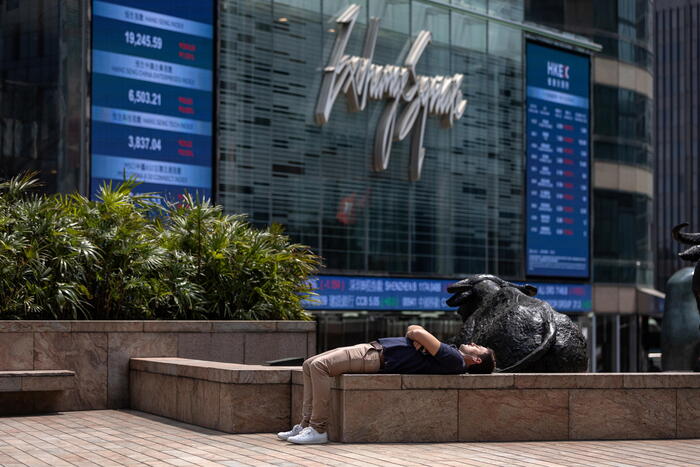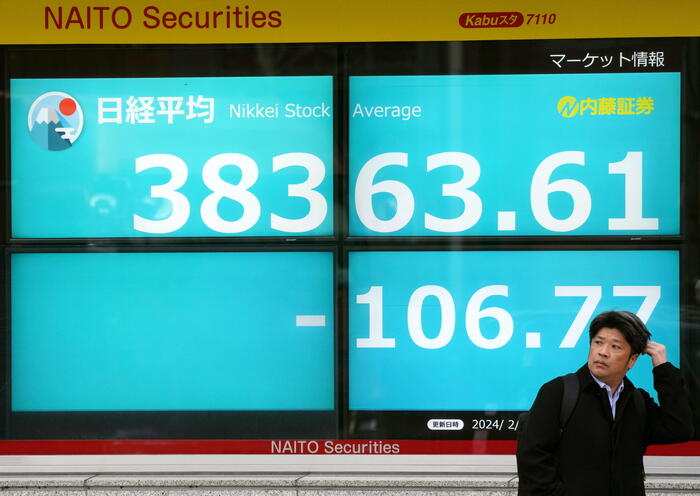The Japanese government announced on Wednesday (18th) that its first-quarter GDP decreased by 0.2% from the previous quarter and 1% from the same period last year, indicating that it has initially entered an economic recession.
Affected by the tightening atmosphere of global central banks, the impact of the Russian-Ukrainian war on supply chains, and the fact that the new crown epidemic is still not fully under control, Japan's economy will still face multiple difficulties this year.
The Japanese government recently announced that it will gradually ease the entry of foreign tourists in May, ending the nearly two-year policy of banning foreigners from non-essential entry since 2020.
The Japan Tourism Agency announced on Tuesday (17th) that the first batch of small tour groups from the United States, Australia, Thailand and Singapore will be allowed to enter in late May.
This is good news for Japan's weak economy and may provide some support for the recently depressed yen exchange rate, but the Japanese economy is mired in structural problems, and the switch may not do much.
Japan's economy is uncompetitive
Japan will gradually reopen the tourism industry, and the number of tourists will be greatly limited initially, and the short-term economic stimulus will not be very large.
In the long run, even if Japan's tourism revenue returns to pre-pandemic levels, it will have limited effect on saving Japan's economy.
Because the core problem facing the Japanese economy is the outflow of industry, the hollowing out of the industry is serious, and the long-term competitiveness is difficult to improve.
Taking the data before the epidemic in 2019 as an example, the secondary industry only accounts for 25% of the overall GDP, while the tertiary industry accounts for 70%.
And in the remaining major industries, including automobile manufacturing, shipbuilding, steel, etc., many of them are facing long-term downward pressure.
Taking the automobile industry as an example, it accounts for nearly 40% of Japan's industrial production value and employs nearly 10% of Japan's labor force.
It is not only an important economic pillar of Japan, but also the main export goods in its international trade in goods.
However, the Japanese auto industry is under pressure to be phased out because it has not caught up with the important revolutionary process of new energy vehicles.
In recent years, with the vigorous promotion of new energy vehicle policies by the Chinese mainland and the US government, Japan's auto exports have been hit hard, which is one of the main reasons why Japan has been in a trade deficit for eight consecutive months.
In addition to the automobile industry, the shipbuilding industry and the steel industry have also lost ground to other international competitors in recent years, and their market share has been gradually replaced by China and South Korea.
It is no wonder that a recent study by the Japan Center for Economic Research (JCER) predicts that Japan's per capita GDP will be surpassed by South Korea and Taiwan in 2027 and 2028, respectively.
The automobile industry accounts for nearly 40% of Japan's industrial production value and employs nearly 10% of Japan's workforce.
(VCG)
Although the development of tourism can alleviate the problem of declining international trade income, it cannot fundamentally improve the problem that Japan has not been able to compete with neighboring regions.
Even, over-reliance on tourism may cause the problem of over-representation of low-end service industries, causing the overall economy to fall into "Baumol's disease".
So reopening the tourism industry is not a panacea for activating the Japanese scriptures.
Japan is a lesson for Hong Kong
Many of the economic problems that Japan is currently facing are also seen in Hong Kong's economy. Hong Kong should learn from Japan's example and actively improve the competitiveness of its local industries.
Before the epidemic, the economies of Hong Kong and Japan were also in a moderately prosperous state, stimulated by tourism.
Hong Kong relies heavily on the consumption of mainland tourists. Although the GDP directly calculated from tourism accounted for only 4.5% of Hong Kong's total in 2018, there are still many industries derived from tourism, such as retail, which are not included in the calculation.
, although tourism brings good economic benefits, it is concentrated in the low-end service industry, which cannot improve the quality of Hong Kong's economy, nor can it improve Hong Kong's economic competitiveness.
(Xinhua News Agency)
However, although tourism brings good economic benefits, it is concentrated in the low-end service industry, which not only fails to improve the quality of Hong Kong's economy, but also makes it difficult to enhance Hong Kong's economic competitiveness.
If Hong Kong's financial industry is far superior to Japan's, Hong Kong may be caught in a more serious economic structure problem than Japan.
Social events and the epidemic in 2019 have hit Hong Kong's tourism industry hard. Some people hope that the reopening will stimulate Hong Kong's economy to bottom out.
We have no objection that customs clearance should be done as soon as possible and the tourism industry should be revitalized, but it should not be mistaken for this to be enough to solve Hong Kong's economic problems.
Hong Kong must spend more energy and funds on developing high value-added industrial chains and enhancing industrial competitiveness in order to avoid the similar Baumol disease in Japan.
U.S. monetary tightening is imminent, Hong Kong must have investment value for electric vehicles, and it is indispensable for electric vehicles to compete for hegemony


/cloudfront-eu-central-1.images.arcpublishing.com/prisa/3I74UEXLYRBBRPGPSGWNN6WXH4.jpg)




